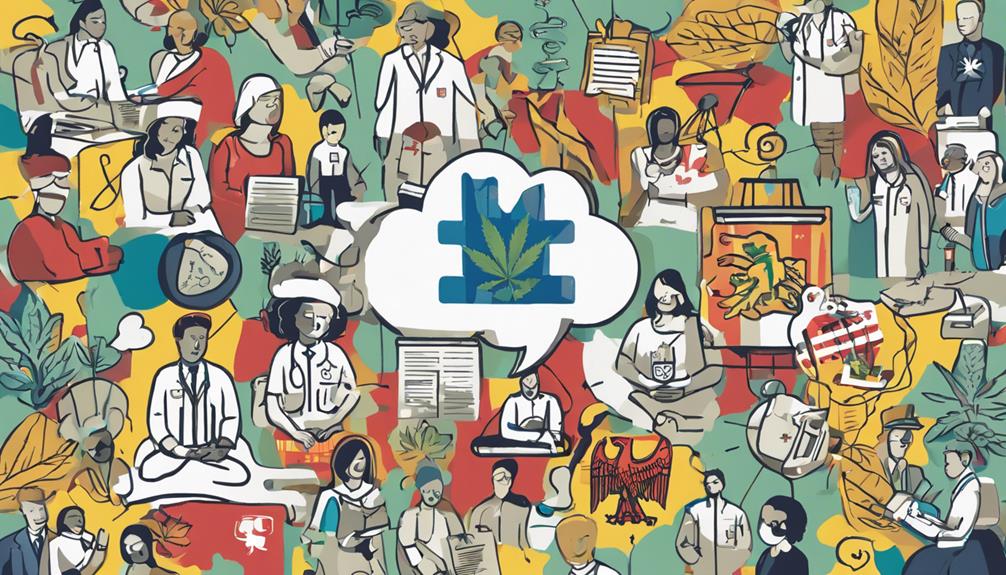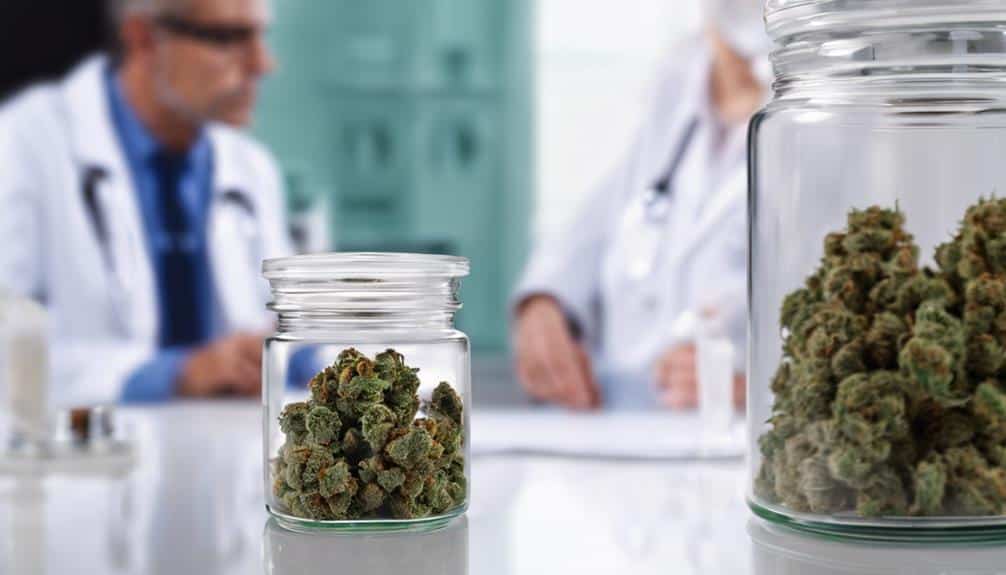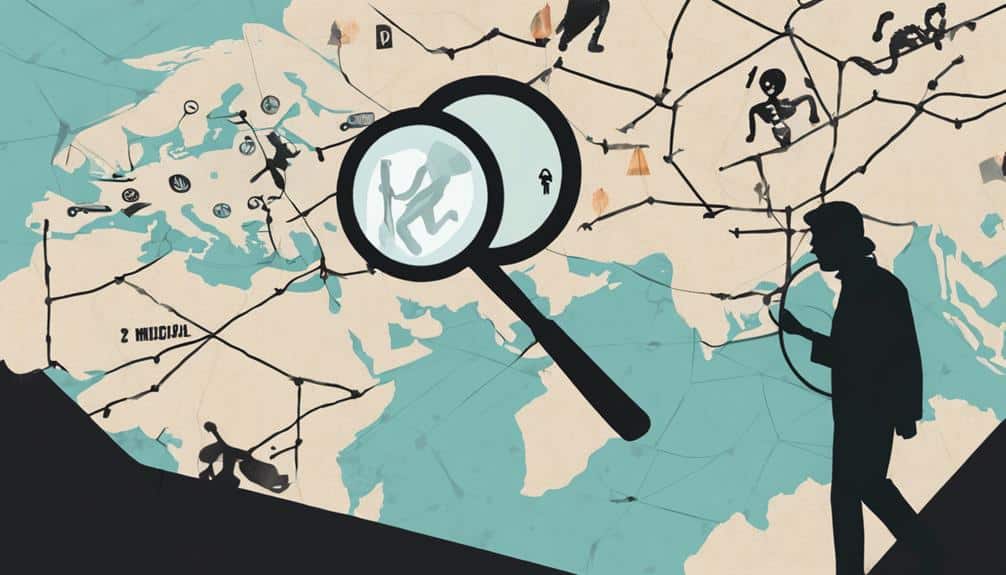Did you know that nearly 5% of Maryland’s population is registered as medical marijuana patients? As a patient, you’re likely familiar with the challenge of recreational shortages. But how can you navigate these supply deficits? By developing a strategic plan and understanding the market, you can ensure you’re not left in a bind. Let’s explore some strategies to keep your supply stable, regardless of fluctuations in the recreational market.
Understanding Maryland’s Marijuana Laws

Maryland’s marijuana laws may seem confusing at first glance. However, we’re here to help you navigate through the legal restrictions and provide clear patient education.
In Maryland, medical marijuana is legal for qualifying patients. However, the law strictly regulates its use. You need certification from a registered physician and must apply to the Maryland Medical Cannabis Commission for a patient ID card. It isn’t as simple as walking into any store to buy it; purchases must be made from licensed dispensaries, and there are limits on possession amounts.
Understanding these restrictions is crucial to avoid legal complications. Ignorance of the law isn’t an acceptable defense, so take time to educate yourself.
You also need to understand the potential benefits and risks of medical marijuana. While it can be effective for certain conditions, like any medication, it can have side effects.
Patient education is vital in this process—it’s not just about following the law but making informed decisions about your health. Consult with healthcare professionals and do your own research—knowledge is power and the best way to navigate Maryland’s marijuana laws.
Recognizing Recreational Shortages
Understanding Maryland’s marijuana laws can help you make informed decisions about your health. However, being aware of the ongoing issue of recreational shortages is also critical. Despite the increasing popularity of medical cannabis, supply for recreational users often falls short, leading to potential interruptions in usage.
Recognizing recreational shortages is a crucial step in preventing them. Watch for signs like limited product availability or frequent stock-outs at your local dispensaries. It’s essential to stay informed about market trends and anticipate potential shortages, especially if you rely on cannabis for health reasons.
In case of shortages, finding alternatives can be a lifesaver. This doesn’t mean resorting to illegal sources but considering other legally approved therapeutic options available to you.
You might explore different strains or forms of cannabis, such as edibles or oils.
The Importance of Medical Marijuana Supply

Amid recreational shortages, maintaining a consistent medical marijuana supply becomes even more important. For those dependent on this treatment, it’s not just about convenience—it’s an essential part of their health and well-being.
Supply management plays a pivotal role here. As a provider, you have the responsibility to ensure a steady supply for your patients. Your ability to manage and forecast stock can make the difference between a patient receiving their treatment on time or enduring discomfort. By effectively controlling your supply chain, you’re not just maintaining business efficiency—you’re safeguarding the health of those in your care.
Patient access is another crucial aspect. It’s not enough to have medical marijuana available; it must be accessible to those who need it most. This isn’t about recreational users finding their preferred strain—it’s about patients being able to access their medicine without obstacles. The proactive steps you take can make a significant difference in their quality of life.
Communicating With Your Provider
Open communication with your provider is a cornerstone of effective medical marijuana treatment. You must take charge of your health and be proactive in discussing your needs and concerns. This isn’t just about filling prescriptions—it’s about building relationships with providers that ensure your needs are met, especially during periods of recreational shortages.
Patient education plays an essential role in this communication. By understanding the intricacies of your treatment, you can articulate your needs more effectively. Don’t hesitate to ask questions about dosage, strain selection, or potential side effects. With informed questions, you’re not just a patient—you’re an active participant in your care.
Discussing personal health issues isn’t always easy, but remember—your provider is there to help. Honesty and transparency are key; if you’re experiencing issues with your current treatment, speak up! Your provider can’t fix a problem they don’t know exists.
Lastly, stay updated on changes in Maryland’s medical marijuana landscape—policies and availability can change quickly so keep the lines of communication open with your provider to avoid unnecessary disruptions in care.
Advocating for Medical Patients’ Rights

As a medical marijuana patient, it’s crucial that you’re aware of your rights and actively advocate for them, especially during periods of recreational shortages. Understanding legislative updates and patient advocacy initiatives can significantly impact your wellbeing.
Firstly, understand that your medical need for cannabis is recognized by law. This isn’t about recreational use—you’re using this substance under a doctor’s guidance to manage a health condition. That’s your right, and it’s protected by law. When shortages occur, dispensaries should prioritize medical patients.
However, accessing dispensaries can sometimes be challenging during periods of high demand. In these instances, patient advocacy becomes even more critical. Join local advocacy groups, connect with others in similar situations, and use your collective voice to influence policy.
Stay informed about new bills and amendments that could affect your access and rights as a patient.
Exploring Alternative Treatment Options
In the realm of medical marijuana treatment, remember there are multiple paths to relief. You can explore an array of natural remedies and holistic care methods tailored to your health needs.
Natural remedies aren’t just about herbs—they encompass lifestyle changes including balanced diets, regular exercise, mindfulness practices. As part of this journey you may discover alternative therapies like acupuncture or yoga which complement traditional treatments.
Holistic care treats the whole person—not just symptoms—and understands how mind-body-spirit interconnection impacts overall well-being. This approach might involve meditation or stress management techniques alongside prescribed medications promoting healthier lifestyles.
Navigating Black Market Risks

Despite the allure of easy access and seemingly lower prices, venturing into the black market for medical marijuana comes with significant risks. You may be tempted by black market alternatives, especially when faced with potential shortages in legal, medical supplies. However, patient safety must always be your top priority.
The black market is unregulated—there’s no guarantee about product quality or safety. You could end up with a harmful substance or a strain of marijuana that worsens your condition. Not to mention, purchasing from the black market supports illegal activity and can lead to legal consequences.
Additionally, you’d miss out on guidance from healthcare professionals who can advise on appropriate dosages and strains for your specific condition. These professionals are also equipped to monitor progress and adjust treatment plans as necessary.
In short, while black market alternatives may seem appealing, the risk to health and legal standing far outweighs any potential benefits. Instead, work within the law with healthcare providers ensuring safe effective treatment.
Staying Informed About Policy Changes
Why should you stay informed about policy changes related to medical marijuana? Knowledge is power—especially when it comes to health. It’s crucial to keep up-to-date so you can make informed decisions about treatments.
Policy changes can alter regulations around medical cannabis affecting how you access medication. They can influence possession limits or available products and where they can be legally purchased—all potentially impacting your treatment plan if caught off guard.
Patient education plays a pivotal role in staying informed—it’s not just about current happenings but understanding why these changes occur and how they could affect future treatments. Ensure you’re using reliable sources and engaging in conversations with healthcare providers for accurate information.
Conclusion
Concerned about recreational shortages affecting your medical marijuana supply in Maryland? Don’t worry. By understanding state laws, advocating for rights, and exploring alternative treatments, you’ll manage just fine. Stay connected with your provider and stay informed about market trends. And remember—straying into the black market poses risks. Your health is paramount—don’t let recreational shortages hinder treatment.
We encourage you to visit Fells Point Cannabis Docs of Maryland or call us at (410) 401-4200 for more information. Our friendly and knowledgeable team is here to ensure you never have to worry about your medical marijuana supply. Don’t hesitate to reach out—we’re looking forward to hearing from you!
